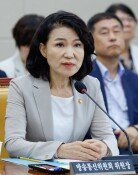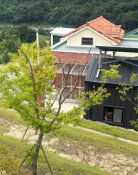Ethnic Koreans from China, ``Treat Them as Fellow Country People`` vs. ``Treat Them by Law``
Ethnic Koreans from China, ``Treat Them as Fellow Country People`` vs. ``Treat Them by Law``
Posted July. 05, 2001 20:35,
``Prayer meeting and cross march for the survival and human rights of the ethnic Koreans from China,`` was held yesterday afternoon in Sajik Park, Jongno Ku, Seoul. This rally was hosted and sponsored by the National Council of Churches in Korea and other Christian organization. In the midst of rain, 600 participants requested for the improvement of the treatment for the ethnic Koreans from China. Marching toward the Central Government Complex after the meeting, they called for the government’s improvement of the system saying that ``treat the ethnic Koreans from China as our fellow country people, not as the illegal foreign laborers.``
Meanwhile, Rev. Suh Kyung-Suk of the Seoul Ethnic Korean Church (Seoul Chosunjok Kyohoi), which has played the role of shelter for the illegal ethnic Korean residents since 1999, went on the hunger strike since June 21 protesting against the deportation of the ethnic Koreans
The government has deported 1,700 illegal foreigner residents since June 18, and 300 of them are reported to be ethnic Koreans from China. Although they came to Korea with the `Korean dream`, they live in the midst of the fear of deportation stigmatized as illegal residents. People have voiced that crackdown is not the only proper way, rather the government should embrace them through the reform of the system.
- Actual condition of the ethnic Koreans from China: Mr. Yu Suk, from Heirungjang Province, came to South Korea after having paid the borrowed 9 million won to a broker in 1995. However, he was deported in November 1996 after having unexpectedly been questioned by the police. Since Mr. Yu could not pay the interests of the borrowed money, he came back to South Korea after having changed his name with another 10 million won debt. However, he is living in a constant fear that he may be found and be deported again.
According to the statistics of the Ministry of Justice, the number of illegal ethnic Korean residents is 60,700 as of the end of May. However, the civic organizations estimates that the number will be more than 150,000 including the number of illegal entrants. Since they are not the legal Koreans, they become illegal residents after 90 days, except the case of the industry trainees and the visitation of relatives. At most 6,000 people by the quota system can come to South Korea as the industry trainees. Moreover, whether as an industry trainee or as an illegal entrant, they spend an approximately 10 million won per person to come to South Korea. This is the openly accepted cost in China. Most of people raise the money through debt. However, because they quickly become the illegal residents, they live in the fear of deportation before they pay back the debt. Therefore, they have to endure employers’ unreasonableness and inhumane treatment without saying a word.
- Complaints and demands of the ethnic Koreans from China: Park Sung-Hee (66, female), who came to South Korea last December, sighed saying that ``President won the Nobel Peace Prize due to his dedication for the human rights. Then, how could he not think of us as fellow country people?`` Ethnic Koreans from China insist that if the government wants to deprive our rights to live in our grandparents’ homeland, they should at least allow us to make money here. This is to say that the government can give us a little bit of preference even if it can’t treat us as fellow country people.
Kim Hyun-Dong, director of Foreign Koreans Affair at the Korean Sharing Movement (representative Song Wol-Ju), said that ``the government should take a proper measure to allow them to say at least four years in which they can save money after paying for the 10 million won debt. However, the government’s position is determined. An Immigration Bureau official of the Ministry of Justice said that ``if the government gives preference to the ethnic Koreans who are legally foreigners, it is not fair to other foreign residents.``
- Is there any other alternative? Rev. Suh Kyung-Suk suggested at the rally yesterday that the government should expand the quota to 30,000 ethnic Koreans, and let them report voluntarily by guaranteeing the consecutive departure in accordance with the length of one’s stay, instead of deportation. Rev. Suh said, ``the government should open the door more to the ethnic Koreans who are the same country people. We should bear in mind that they can play a significant role when our companies make inroads into China. Furthermore, they can advertise South Korea when they go to North.`` However, a Ministry of Justice official said, ``It is questionable whether the ethnic Koreans will report voluntarily. If their stay is legalized, a big migration will occur in the ethnic Korean communities in China threatening the breakdown of the society. Moreover, a large influx of these people may disturb our labor market.``
Min Dong-Yong mindy@donga.com







